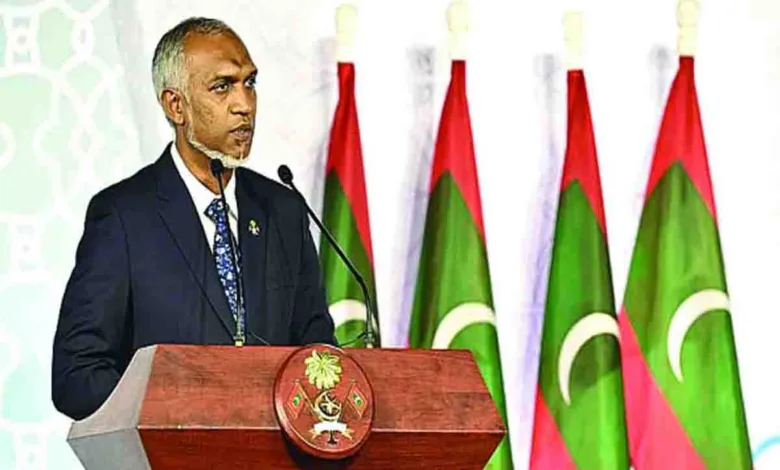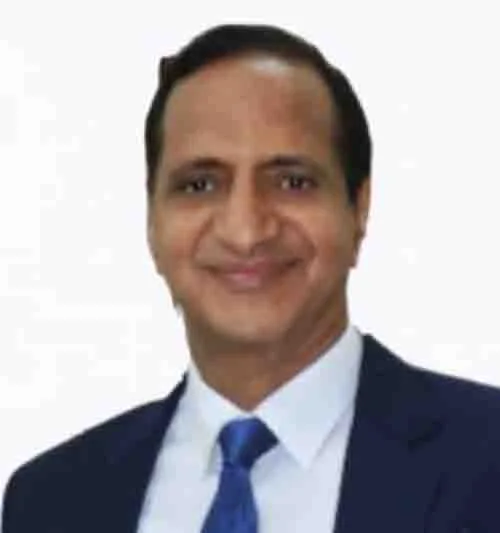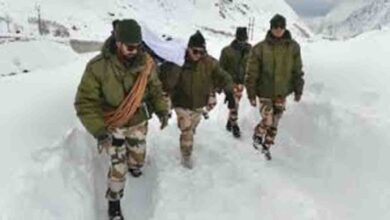Muizzu’s Maldives muddling: Real concern is terrorism, not tourism

Monday, 05 February 2024 | Kripa Nautiyal
GUEST COLUMN
 Kripa Nautiyal
Kripa Nautiyal
The recent boarding of three Maldivian fishing boats by Indian Coast Guard ships at sea and subsequent over reaction by highly pro-China Maldivian President Mohamed Muizzu in seeking clarification from India is on expected lines. The Indian Navy and Coast Guard are renowned world over for their professionalism and commitment to ensure safety and security of our maritime frontiers within the legal framework and with due regard to international humanitarian law. Maldives under the anti-India Muizzu has created yet another false narrative in a series of such deliberate rhetoric, with an ulterior motive to defame India. Maldives has long been synonymous with luxury tourism. However, beneath the surface of this paradise, the shadows of security threats loom large. Involvement and credible links of a close relative of President Muizzu with a terrorist organisation has made the situation more precarious for this nation.
Out of my many visits to Maldives, the memories of this strategically located tiny island nation takes me back to December 26 2004 when the Indian Coast Guard ship Sagar, that I was commanding, was diverted from deployment off Maharashtra coast to proceed with best speed to render assistance to severely affected southern islands of Maldives after a tsunami disaster that had caused havoc in many countries including Maldives and India. Plenty of relief material and two helicopters were embarked onboard. An Indian Coast Guard Dornier was the first aircraft to land at Maldives airport after the tsunami without any assistance from local ATC as it was not manned due to severe damage to various facilities. This was followed by landing with relief material by Indian Air Force and Indian Navy aircrafts. Our ship reached Maldives along with other naval ships and restored the electricity supply, provided required relief material and assisted in medical assistance and air evacuation of the seriously injured. This goodwill gesture of India – a friend and a dependable neighbour was greatly appreciated by the citizens and government of Maldives. This gratitude of Maldivians was genuine as India despite having faced the brunt of the tsunami itself, spared operational assets, relief material and manpower on a regular basis to Maldives till normalcy was restored.
Earlier also, India had provided swift intervention to thwart the coup attempt in the Maldives in 1988. This action of India was hailed world over. Support during the water crisis in Maldives in 2014, medical and logistics support during Covid-19, undertaking various projects including Indira Gandhi Memorial Hospital, Faculty of Engineering Technology and many ongoing projects are developments too recent to be forgotten.
Despite India being a first responder in crisis in Maldives, the election of Muizzu, a known anti-India and pro-China face, has made Maldives an ideological battlefield for India-China competition. Visit of a Chinese research ship to Maldives and President Muizzu asking India to stop hydrographic survey has made the situation more complex. This article is not at all a retaliation of disparaging, remarks against India and our Prime Minister by three Maldivian ministers, which at best could be described as an undemocratic, derogatory, full of negativity, utterances of abnormal minds and unacceptable in any civilised society, particularly in the international arena. The aim of the article is to spell out imminent danger of spread of terrorism in Maldives and countries in its proximity due to mushrooming of terrorism in Maldives and President Muizzu’s close relative’s involvement with a terrorist organisation.
Lieutenant Hassan Amir of Maldives National Defence Force in his thesis “Islamism and Radicalisation in the Maldives” had in 2011 given enough indication about Maldives becoming a fertile ground for terrorism. It emerged in the thesis that, a number of Maldivian youths studying in Pakistani educational institutions were radicalised and many of them were also known to have travelled to various Jihadi training camps in Afghanistan – Pakistan border areas. On return to Maldives, they advocated a Sharia-based state of Maldives.
This thesis also gives an account of the arrest of a Maldivian, Ibrahim Fauzee by US Forces from an Al-Qaeda hideout in Pakistan. He also had a telephone number of a Sudanese teacher who was engaged in assisting Arabs travel to terrorist training camps in Afghanistan. Fauzee, after knowing his combatant status, was released in 2005. However, ties between Maldives and regional terrorist organisations seemed quite credible.
In an interview to CNN IBN in 2009, President Nasheed had confirmed that thousands of Maldivians youths were being recruited to study at various religious Madarsas or to join Jihadi operations in Pakistan and that this presented a fundamental threat to the security of Maldives. An open letter addressed by founder and chief editor of Goa Chronicle, Savio Rodrigues to President Muizzu has alleged that the President of Maldives’ wife Sajidha Abdullaha’s brother Sheikh Abdullaha Bin Mohammed is head of the Islamic radical organisation – Jamiyaath Salaf. This organisation, as per Rodrigues, indoctrinates young minds to become terrorists. He has termed this organisation, involved with Islamic extremism as “wolves in sheep’s clothing”. This letter of Rodrigues also highlights the presence of 243 Maldivian terrorists trained by ISIS in jail in Afghanistan besides giving credible links of 36 Maldivians with ISIS in Syria. These terrorists are slated to be brought to Male in a chartered flight soon.
The arrest of Mohammad Shahnawaz, a mining engineer in India in September last year has also revealed his indoctrination by a Maldivian woman for expansion of ISIS in India. Shahnawaz along with two of his friends were indoctrinated to orchestrate multiple bomb blasts in Ayodhya, Delhi, Mumbai and Gujarat and they had undertaken recce of the places also.
The Intelligence Review weekly assessment of South Asia, on South Asia Terrorism portal (Jan 9, 2024) also unambiguously highlights that Maldives is not only a hub of Islamic State (IS) operatives, but also of Pakistan based terror groups and narcotics smugglers as well. Sources also indicate many Laskar leaders having settled in Maldives to expand their global activities.
These facts make it abundantly clear that Muizzu’s Maldives muddling, more so with his own close relative heading the organisation which indoctrinates young minds, will not only have disastrous consequences for Maldives in the long run, but will also have bearing on the regional and global security scenario as links of Maldivian nationals with various global terrorist organisations have already come to the fore.
Maldives stands at a crossroads and Muizzu’s leadership takes a centrestage in steering the nation through these uncharted waters. Navigating the delicate balance between luring tourists and securing the Maldivian and its neighbour’s shore from these home grown terrorists is an uphill task for Muizzu and his inexperienced and insensitive ministers. As for India, it has, despite knee jerk reaction from Maldives, maintained pragmatism and maturity expected of a trusted democracy and is monitoring every move of our neighbour closely.
(The author is a retired additional director general of Indian Coast Guard. Views expressed are personal)






